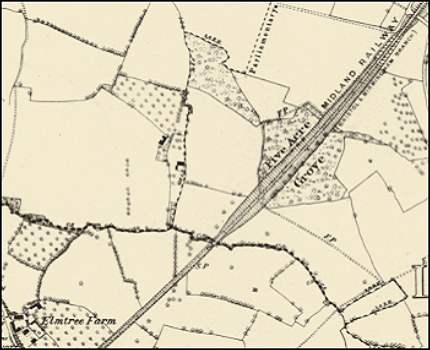

In the previous edition of the ECN we looked at the life of one of the more eccentric and interesting characters from the village’s past (‘Queen’ Madge Sleeman). In this edition, we’ll look at another – William (‘Billy’) Goodrich. Unlike Madge, there’s little recorded about his life although by all accounts, a couple of generations ago, he was one of Eastington’s better known personalities.
Billy was born around 1880 and, according to Alfred Keys’ book of 1954, was reputedly the illegitimate son of a local squire. Keys, who probably knew Billy personally, described him as “half-crazy, half- inspired; in the true line of descent from Shakespeare’s fools”. Apparently, conversations with Billy usually comprised a mixture of childish babblings combined with deep wisdom.
Most of Billy’s adult life was spent in a small cottage (“his hermit hovel”) located in the fields somewhere on the boundary between Eastington and Frocester. Even before Billy’s time, the area of farmland surrounding his cottage had been known locally as The Wilderness. It was about a mile from the nearest road and well away from neighbours. He lived alone and seems to have survived by growing his own food and keeping pigs and chickens. In fact, one of the few reasons for visiting the centre of the Eastington was to take the occasional pig to the local blacksmith John Howell, whose forge was next to where the Co-op now stands. There was another smithy closer at hand at Frocester, but Billy preferred the way that John Howell fitted iron rings in his pigs’ snouts. As a result, Billy nicknamed him ‘Gentleman John’, a name that stuck.
During Billy’s rare visits to the village, one can visualise the local children trailing cautiously behind him, anxious to get a look at the wild man who lived out in the fields.
In a little shanty made of stone
Poor old Billy lives alone
For eighty years so I have heard
He rarely from his cottage stirred
In this old shant he reigns supreme
And can hold his own with any theme
He cares not for the world a rap
Provided the cask of cider is on tap
Which from an old black can he drinks
And with each draught the cider shrinks Only inside it can be seen
For the cobwebs form a perfect screen They thickly hang from wall and raft
To shield poor Billy from the draught.
The poem goes on to describe how Billy wore an old sack around his neck and his “tall gaunt figure, aged and worn” to help keep out the cold. It also goes on to mention:
…With handkerchief as black as pitch,
He tries to soothe his troubled snitch.
Billy’s cottage is no more and where it stood and when it was torn down has been lost in the mists of time. At one time, the cottage’s outline was discernible in the grass, but even this has long disappeared. An income tax valuation of 1909 for Eastington mentions a cottage known as Thickett House occupied by a William Goodrich and owned by Graham Clarke – perhaps this was Billy’s?
He was so well-known that some long-forgotten local poet crafted a piece of doggerel about his life. A copy of this was kindly given to me many years ago by the late Mr Shill who used to give talks on the village’s history. Here’s a few extracts:

From the OS map of 1884.
The two remote cottages in the centre were close to the parish boundary – both contenders for Billy’s home.
Eastington lies to the left.
Even though Billy clearly enjoyed solitude, in his later years, particularly on a sunny Sunday afternoon, a steady stream of visitors from Eastington and farther afield often made its way through the fields to his humble homestead. As with any visit to someone’s house, it was usual to bring a gift – this usually took the form of a bottle! Without this ‘lubrication’, Billy was prone tolengthy periods of silences.
However, the gift of alcohol loosened his tongue and the visitors were kept appropriately amused. As we heard earlier with ‘Gentleman’ John Howell, a speciality of his was the giving of nicknames to local people, both good and bad. These tended to be well-observed and witty so unfortunately for the latter, they had a habit of sticking for life.
Stephen Mills




| Parish Council Newsletter |
| Parish Council Notices |
| District council Newsletter |
| Village Agent |
| Bath Road |
| More Proposals |
| Nbhd Development plan(NDP) |
| Playgroup |
| Teddy Tunes |
| Eastington Horse Show |
| St Michaels Anglican Church |
| Eastington Methodist Church |
| Severn Vale Rotary |
| Longfields |
| E.C.Orchard Group. |
| Slimming World |
| Jolly Joggers |
| PROWD (footpaths) |
| Billy Goodrich |
| Bee Keepers Diary |
| Monster Caterpillar |
| Events |
| Situations Vacant |
| Advertisements |
| Puzzle Page |